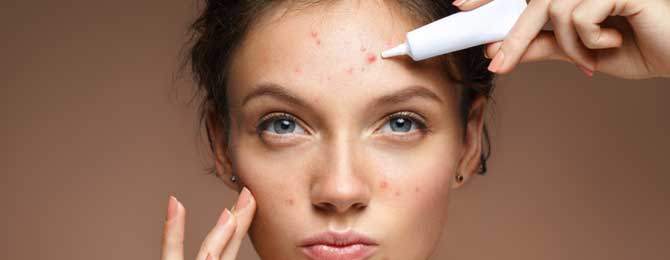
Wait, we have a special
offer for you!
Click the button below to get your discount.
Get my coupon now No thanks, I'd like to pay full price

There’s no part of a person that’s more consistently on display than their face. It’s the reason women have been applying makeup for hundreds of years, and men have been shaving every morning for just as long. The unfortunate thing about acne is that it’s as impossible to hide as it is to prevent it for many people – especially teenagers.
They’re not about to wear a balaclava to school, and no matter how much some of them wash their face there’s just simply too much sebum production going on to prevent them getting clogged pores.
That’s really at the root of what causes acne, and there are different types of acne as well. The long and short of preventing acne is that it’s often not possible, but there are steps you can take to limit its development and treat it effectively.
Let’s have a look at them, as well as discuss what causes adult acne. This annoying skin condition doesn’t only cause distress for youngsters.
Acne affects up 70+ million people in North America every year and that includes all the different types of acne; pimples, whiteheads, blackheads, cysts, and nodules. As mentioned above, sebum is the primary culprit when determining what causes acne. There is a very specific reason why acne is most commonly seen in young people around puberty age.
At this point in their growth towards adulthood the sebaceous glands in their skin become hyperactive, and what many may not know is that this hyperactivity is promoted by male hormones (androgen most notably) in the adrenal glands in both males AND females. Androgen in females eventually ends up being converted to estrogen, but initially it’s the same hormone as in the young men and it promotes the same gland hyperactivity.
Factors that can increase the severity of acne outbreaks include genetics, menstruation cycles for women, anxiety and stress, living in hot and humid climates, and using oil-based makeup. Plus, many people choose to squeeze pimples to drain the pus out of them and hopefully make them disappear. While this is a temporary fix, doing it can actually make acne worse.
For teenage acne sufferers, the long and short answer for what causes acne is that you’re an entirely normal person with a physiology that is shifting from adolescence to adulthood. As to what causes adult acne, that’s usually attributable to specific factors that are unique to the individual.
These factors for adult acne can include:
Naturally occurring changes in hormonal levels in the body, especially for women
Medications containing androgen and lithium
Cheap cosmetics that are especially greasy on the skin
Emotional stress or turmoil
Menstruation for women
Certain types of acne are much more a cause for concern because of the way they may lead to permanent scarring on the face or upper back. Cyst acne is first and foremost here, so let’s now move to discussing acne treatment options.
The reason acne becomes pronounced and problematic isn’t just because the pore is being clogged with sebum. It’s because the clogged pore becomes infected with bacteria due to the fact that it can’t function and expel impurities like a healthy pore can. There are different types of bacteria that can infect the pore, and it’s important to know that one bacteria strain does the opposite – it actually works to keep the skin pimple free!
If you’ve got mild acne, you can consider yourself fortunate because it’s usually quite straightforward dealing with it. It can usually be treated with over-the-counter medications like gels, soaps, pads, creams, and lotions. Look for ones that contain one or more of the following proven-effective reagent ingredients:
Resorcinol
Benzoyl Peroxide
Salicylic Acid
Sulfur
Retin-A
Azelaic Acid
Vichy Nomaderm Acne Prone Skin is an excellent, highest-purity product that has these ingredients and has a solid reputation for helping people get rid of acne.
Moderate to severe acne is typically best treated with prescription acne medication, and some of the better known ones are:
These medications are especially effective when taken in conjunction with the use of a prescription topical antimicrobial like one of the following:
Cystic acne will often require a stronger course of treatment, and isotretinoin is used to treat severe cystic acne. It is a strictly controlled medication that most pharmacies will not carry behind the counter on a consistent basis, but be aware of it if you have this type of acne and speak to your physician or dermatologist about it. Patients choosing to treat their acne with isotretinoin must sign a consent form stating that they understand the risks that come with it.
Now that we’ve shared the basics of what causes acne and some of the OTC and UTC options for treating it, let’s wrap it up here by sharing a list of helpful practices you can follow to aid your skin in staying as clear and blemish-free as possible.
Don’t over wash your face – no more than twice day, even if you’re using an acne soap
Try to touch your face with your fingertips as little as possible
Wash your hands frequently
Choose makeup that is made for sensitive skin. Avoid oil-based cosmetics
Avoid excessive sun exposure – it causes the skin to produce more sebum
The good news is that acne outbreaks are usually only temporary events, and for most people they can be assured that the presence of pimples and other type of acne isn’t going to be permanent. Treat it effectively with quality skincare products and medications as necessary and you’ll be back to blemish-free skin sooner than you think.